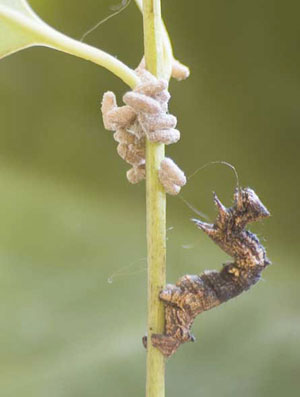 We may think that plants that remain rooted in the soil cannot escape from danger and thus they would immediately surrender to their enemies. However, studies indicate that it is not like what we thought. Plants often overcome their enemies using surprising tactics.
We may think that plants that remain rooted in the soil cannot escape from danger and thus they would immediately surrender to their enemies. However, studies indicate that it is not like what we thought. Plants often overcome their enemies using surprising tactics.
For example, plants sometimes produce harmful chemicals to drive insects that eat their leaves away, and sometimes they secrete chemical scents that attract hunter insects that feed on these bugs. There is no doubt that both tactics are very smart. However, this defense strategy is also imitated as a very effective method in activities carried out in agriculture. Jonathan Gershenzon, who carries out studies in the field of “plant defense genetics” at the Max Planck Institute of Chemical Ecology in Germany, thinks that if this smart strategy is imitated as needed, agriculture can be done without resort to pesticides in the future.
When attacked by caterpillars, some plants immediately secrete a chemical substance that attracts hunter insects that feed on these caterpillars.The insects called for help leave their eggs inside the caterpillars. Larvae dwell inside the caterpillar without its knowledege and hatch from their eggs, find the opportunity to grow by feeding on these caterpillars. Thus, the caterpillars that harm the crops are destroyed via an indirect strategy.
It is again through chemical methods that a plant realizes that its leaves are being eaten by a caterpillar.
The plant sends an alarm signal not because it loses its leaves but as a reaction to the chemicals present in the caterpillar’s saliva. There are many important points in this even though it seems to be a simple matter. We can mention some of these as such:
1. How does the plant sense the caterpillar’s chemical secretion?
2. How does the plant know that it will be rescued from caterpillars when it sends an alarm signal?
3. How does it know that the signal being sent invites insects?
4. What makes the plant directly invite insects (that feed on caterpillars)?
5. The alarm signal is not a sound but a chemical secretion. The chemicals used by insects have incredibly complex molecular structures. Even the tiniest deficit or mistake in the chemical may cause the signal to lose its meaning. In this case, how could the plant produce this chemical that sends the signal all by itself?
There is no doubt that a plant with no brain could not possibly come up with such complex solutions in the face of dangers, analyze chemical substances like a chemist and even produce them or conceive of a planned strategy. No doubt, defeating an enemy using indirect methods is an action that requires intelligence. Almighty Allah is the One Who creates the plant with these characteristics.


